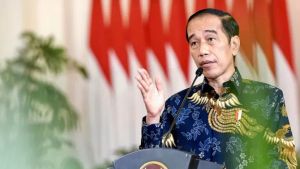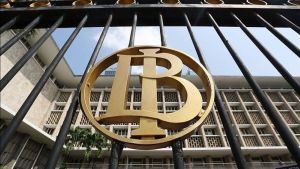JAKARTA - Executive Director of the Institute for Development fo Economic and Finance (Indef) Esther Sri Astuti assessed that the current achievement of economic growth has not been maximized due to several domestic and global factors.
For information, the Central Statistics Agency (BPS) announced that the Indonesian economy in the first quarter of 2024 reached 5.11 percent (year on year/yoy). This economic growth is higher than the fourth quarter of 2023 of 5.04 percent. This growth is supported by household consumption, Eid momentum and the 2024 General Election.
Ester explained that the government's economic growth target has not been achieved due to several global factors such as the impact of the El-Nino weather pattern, the high reference interest rate of the United States and the Middle East geopolitical conflict.
"Our global factor experiences the existence of el nino, the impact of Covid that has not been completed, then there are various geopolitical conflicts, both railway-ucraine, and Israel, which have an effect on the Indonesian economy. In addition, due to the global influence, there is the potential for imported inflation," he explained in a virtual discussion held by Indef, Tuesday, May 7.
According to Ester, the Indonesian economy is very dependent on export and import transactions so that when global conditions are full of uncertainty it will have an impact on the national economy, causing potential imported inflation.
"The more dependent Indonesia is on global conditions, the more popular it is in the global world, there will be an impact on the Indonesian economy," he said.
Ester gave an example, such as the high rate of US interest rates, causing Bank Indonesia to take steps to raise interest rates or BI-Rate as one of the monetary policies.
"We know that the US economy is expanding so that the interest rate continues to be increased by the Fed. Now this is followed by our central bank, as a result there has been an increase in interest rates as an instrument to tighten the amount of money circulating in the community," he said.
In addition, Ester conveyed that from other domestic factors such as fiscal budgets that are getting narrower with a debt ratio of 38 percent of GDP and tax ratios getting smaller and government programs that require fantastic funds so that the government will generate revenue from taxes and excise.
"So that at the same time tightening monetary policy is also included in tightening fiscal policy, therefore as a community, in this case consumers and producers must be more aware of conditions like this," he concluded.
Previously, Finance Minister Sri Mulyani estimated Indonesia's economic growth in the first quarter of 2024 to reach 5.17 percent.
SEE ALSO:
"With the performance we saw earlier good consumers, positive manufacturing activities, capital is quite good in terms of FDI (Foreign Direct Investment) and PMI (Price Managers Index) we predict for the first quarter of 2024 our growth at 5.17 percent. Because it must be completed in March, January-March, we estimate it will still last above 5 percent," he said during a press conference on the KiTa State Budget, Friday, April 26.
Sri Mulyani said the government would still be aware of global conditions that occurred due to geopolitical conflicts, and high interest rates.
Sri Mulyani said there were various projections from the institution on Indonesia's economic growth quite varied, such as Bloomberg estimating growth of 5 percent, BCA (5.1 percent), Goldman Sachs (4.9 percent), Moody's (4.7 percent), Nomura (5.3 percent).
The English, Chinese, Japanese, Arabic, and French versions are automatically generated by the AI. So there may still be inaccuracies in translating, please always see Indonesian as our main language. (system supported by DigitalSiber.id)
















